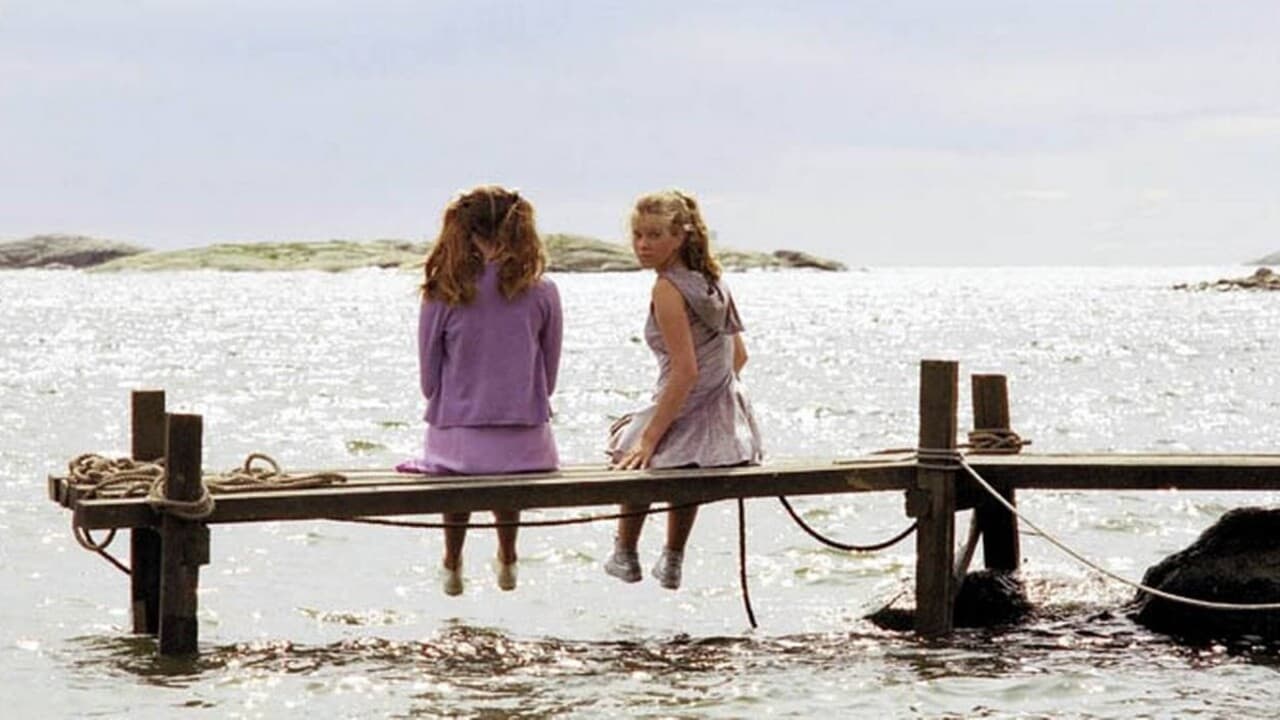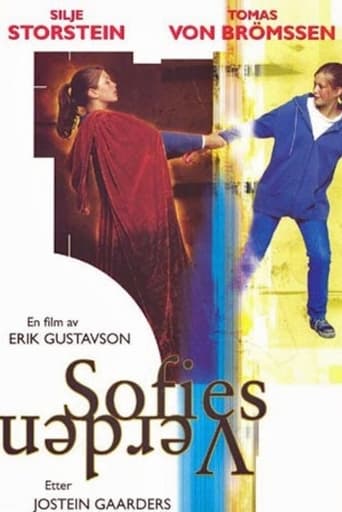Alicia
I love this movie so much
TeenzTen
An action-packed slog
StyleSk8r
At first rather annoying in its heavy emphasis on reenactments, this movie ultimately proves fascinating, simply because the complicated, highly dramatic tale it tells still almost defies belief.
Bessie Smyth
Great story, amazing characters, superb action, enthralling cinematography. Yes, this is something I am glad I spent money on.
Michael DeZubiria
Sophie's World is such a heavy handed philosophical discourse that it comes off almost more like an educational video than a film. It has a simple, made-for-TV feel, probably just because of the way it was filmed, but that seems to fit with the theme of a young girl exploring the mysteries of the universe. She is your everyday Norwegian school girl type, except that she has been receiving mysterious notes in her mail box which force her to re- analyze everything she thought she knew about reality, the world, and even who she is. She is inspired by great thinkers.Sophie is presented as a girl with more going on in her mind than her classmates (which are mostly represented by the astonishingly stupid boys that pop up every once in a while), which may be why she was "chosen" to receive the mysterious notes. She begins to believe that there has to be more to her than just a name and a body, but she gets no help when she talks to her mother, who is a realist and doesn't really believe in or have time for all that philosophical nonsense. Sophie's favorite show is called The Mystery Hour, so already her mind is eager to have something to work on.Through a variety of ways, Sophie finds herself looking back in time to the time of Socrates and Plato, when the powers that be were sadly trying to eradicate all critical thought. There is a frightening scene where Socrates, possibly the greatest thinker of all time, is forced to drink poison, just before which he says, "It's easy to escape death, you just run away. It's much harder to escape wickedness" This is absolutely true, and it's sad to think that that was not the only time independent thought was so cruelly oppressed. It still happens today.The time travel itself is pretty cheesy, but it's just something that the viewer has to understand as taking place – it's not as important as what is found after it's done. This is not, after all, a time travel movie. It's not even really science fiction. It's Philosophical Criticism 101. And by the way, I love the scene where Sophie and her pink haired friend are watching a shockingly bad American movie. Clearly the movie is so awful because it was just filmed to be put in this one, but I hope that's not a subconscious comment on the quality of American film!And like all good philosophy courses, I'm not really sure what to think about a lot of the movie. My mind was full of questions after I watched it, although I should mention that some of the questions that the movie calls attention to are things that I've wondered about many times before, but usually only in passing. I've wondered, for example, what other person looks more like me than anyone else. If you could somehow search through every person who has ever lived, there will be one person who looks more like you than anyone else, and I'm sure the resemblance would be astonishing. There is a scene with a mirror that suggests that it is a completely different person looking back.Overall, the movie encourages philosophical thought, urging you to remember that it is through philosophy that we will find the answers to our questions about the basic human condition. The movie asserts that we are, in fact, in control, and that things don't 'just happen.' Things happen because someone makes them happen. The future is determined by the present. It's ironic that this movie should teach us that people spend so much time being entertained that, ultimately, we end up acting out our own lives, and the line between truth and fiction becomes more and more blurred, which eventually diminishes freedom of thought. The movie tells us that oppression of free thought led to the execution of Socrates, one of the world's great thinkers, which is a massive indictment of totalitarianism. Ironic that the movie should use film as the medium to deliver the message the too much entertainment dulls free thought. But then again, as they say, the medium IS the message
przgzr
* spoilers *Sofie is a single child of a single mother, a typical teenager: her thoughts jump from love and fun to meaning of life. A few short messages in a post-box with simple questions like "Who are you?" intrigue her, and when a strange man Alberto Knox appears a fantastic voyage starts. Alberto leads her like Virgil leads Dante in 'Inferno'. Sometimes we may feel like we're back in school and listen a history lesson. But when education might become boring, story develops. The more we come near to present, the more philosophy enters Sofie's life. And, accepting different philosophic ideas, she starts asking if it is her life at all. Magic and philosophy mixed in a fairy tale and a family movie. And can you believe that UN peacekeeping forces can fit in this mess?"Jacob's Ladder", "Wizard of Oz", "Slaughterhouse five" and "Alice in Wonderland". Where is the border between reality and dream, philosophy and psychosis, imagination and hallucination? Though Alice in Wonderland is more popular, this movie goes beyond, beyond the mirror - like Alice in the second Carroll's story "Through the Looking-Glass". Alice has been told "We don't exist, we are just a dream of Black King"... Sofie finds a mirror, too - but which direction is correct, which side is the right one?Alfredo is a kind of Virgil, but a White Rabbit too. And also a Wizard of Oz: he knows tricks, he is wise, but when things become complicated he needs a girl to push him. Who is in fact Alfredo? He asks Sofie who she is to make her wonder, but he doesn't know the answer either. Is he Sofia's father? Yes and no. He is a dog, a magician, and Sofie's mother doesn't even know him. But he is a ideal substitute for a father, and he does for Sofie more than most real fathers ever do to their daughters. Only one question stays unanswered (and that is a problem!): how can Alberto know about major and his book?Who is this movie for? Not suitable for younger children because they'd be bored, and you must have some knowledge about history. But you don't have to know anything about philosophy. If names like Nietzsche, Kierkgaard or Descartes mean nothing to you, don't worry, the point is that they'll explain their basic ideas. Of course, not for philosophers, they'll find it too superficial. Not suitable for those who expect action, or who lost all abilities to find a child inside themselves. If you are adult with a grain of childhood in your heart, or a romantic teen, or just love unusual and art movies that mix genres, you'll adore this movie. Amusing and amazing, lyric and funny....At the end of the movie you have most answers and explanations. A very beautiful end. Might remind you on "Fahrenheit 491". People must die, but the art remains and survives. And Sofie's World deserves to survive.
hante811
Jostein Gaarder has written a book that is a good introduction to philosophy for young people (and other beginners). Sofie Amundsen is a fifteen year old girl, who meets the mystic philosopher Alberto Knox. Thereby she gets a profound education in the story of philosophy. But unfortunately, the film is something totally different. I counted the philosophers that were even mentioned - they were only six. Instead Sofie gets to travel in time and space, experience the Renaissance, the Russian revolution etc; and thereby she gets to meet some prominent people, such as Shakespeare and da Vinci - or, more correctly, their stereotypes. I don't see anything interesting in this. My opinion is that this film is superficial and meaningless, although it 's technically well done with skilful actors in the main characters. The problem, I think, is that philosophy is not a visual subject.
lady_deirdre
I had not read the book, but was (and am) very curious about it. Seeing the film would hopefully tell me if I would like the book. Well, I am going to buy and read it as soon as I can now! I absolutely loved the film. It was beautifully shot, well acted and the story didn't feel at all like just a book made into a film! The story was engrossing and thorough, even though not all the philosophers were included and only a short introduction was given to what they represented. It made me wanting more, but did not leave a sense of something truly lacking. At several points my mouth was hanging open in awe: I did not expect a Norwegian film to look this stunning. Especially the images of Sofie and Alberto going back in time were breathtaking (did much of the budget go into computer imaging?). Anyone who has the chance: don't miss out on this gem!

